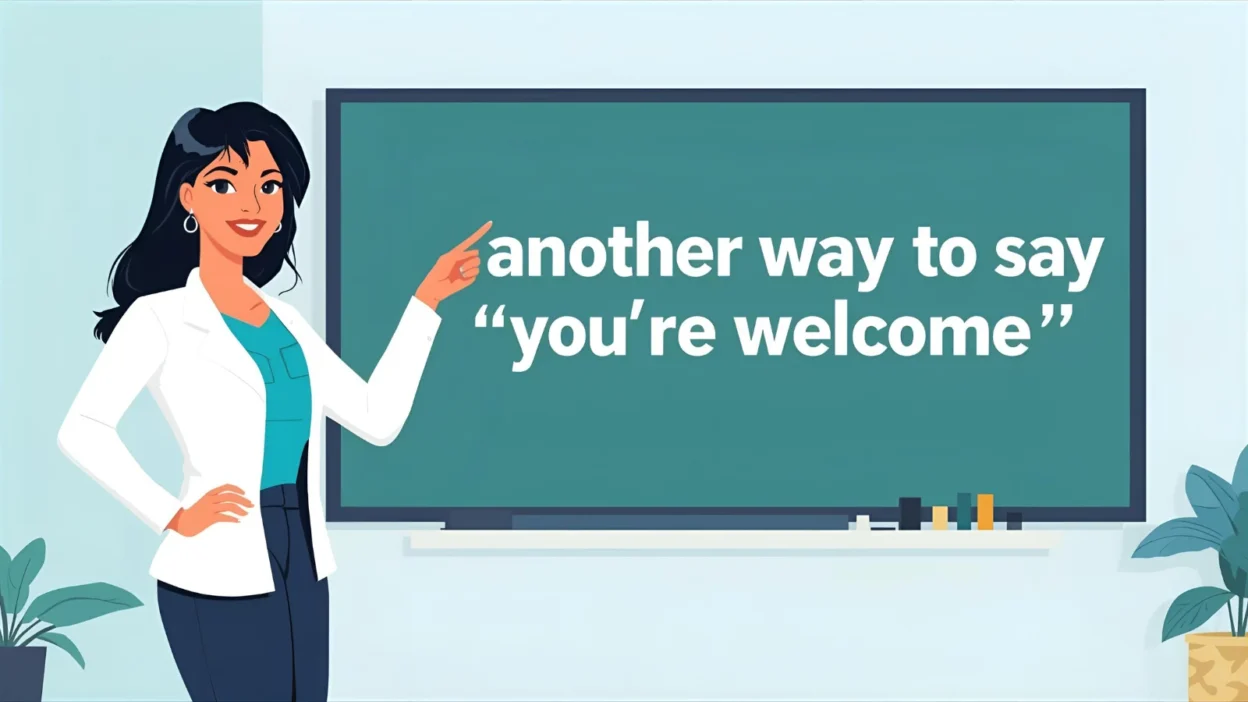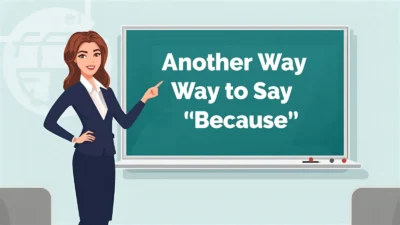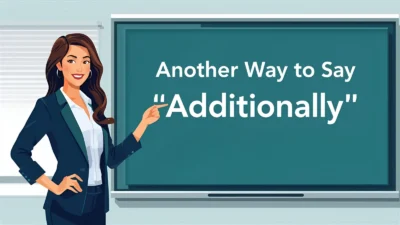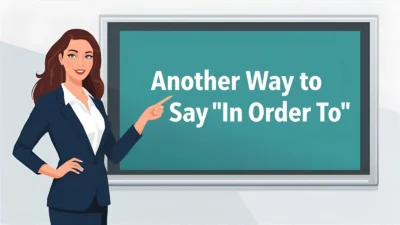The phrase “you’re welcome” is the standard response when someone thanks you. It’s polite, warm, and universal—but using it over and over can feel repetitive or even too formal in casual settings. Depending on the context, you might want a friendlier, more professional, or more creative way to reply.
In this article, you’ll discover 25 smart alternatives to “you’re welcome,” each with its meaning, detailed explanation, real-world usage, best context, and tone description. Whether you’re writing emails, chatting with friends, or speaking in public, these variations will help you respond naturally and appropriately.
1. No problem
Meaning: Suggests that the help wasn’t an inconvenience.
Detailed Explanation: Casual and widely used, especially in spoken English.
Scenario Example: “Thanks for helping me move!” — “No problem.”
Best Use: Informal conversations, everyday replies.
Tone: Friendly, relaxed.
2. Anytime
Meaning: Expresses willingness to help again.
Detailed Explanation: Adds a sense of openness and future availability.
Scenario Example: “Thanks for the ride!” — “Anytime.”
Best Use: Friendships, casual exchanges.
Tone: Warm, reassuring.
3. My pleasure
Meaning: Conveys that helping was enjoyable.
Detailed Explanation: Polite and professional; shows gratitude for being asked.
Scenario Example: “Thank you for your guidance.” — “My pleasure.”
Best Use: Customer service, formal interactions.
Tone: Courteous, professional.
4. Of course
Meaning: Indicates that the favor was natural or expected.
Detailed Explanation: Suggests the action required no second thought.
Scenario Example: “Thanks for watching the kids.” — “Of course.”
Best Use: Friendly or supportive settings.
Tone: Warm, natural.
5. Don’t mention it
Meaning: Downplays the need for thanks.
Detailed Explanation: Suggests the favor was small and not worth highlighting.
Scenario Example: “Thanks for lending me a book.” — “Don’t mention it.”
Best Use: Informal, lighthearted conversations.
Tone: Casual, modest.
6. Sure thing
Meaning: Confirms willingness and agreement.
Detailed Explanation: A friendly, modern replacement for “you’re welcome.”
Scenario Example: “Thanks for covering my shift.” — “Sure thing.”
Best Use: Everyday conversations, casual settings.
Tone: Easygoing, upbeat.
7. Happy to help
Meaning: Shows willingness and enthusiasm in helping.
Detailed Explanation: Expresses joy in providing assistance.
Scenario Example: “Thanks for fixing my laptop.” — “Happy to help!”
Best Use: Customer service, supportive environments.
Tone: Positive, kind.
8. It’s nothing
Meaning: Downplays the effort or importance.
Detailed Explanation: A humble reply that suggests the task was minor.
Scenario Example: “Thanks for the advice.” — “It’s nothing.”
Best Use: Informal, personal exchanges.
Tone: Modest, casual.
9. Not at all
Meaning: Polite way to reassure someone their thanks isn’t a burden.
Detailed Explanation: Common in British English, slightly formal.
Scenario Example: “Thank you for your time.” — “Not at all.”
Best Use: Professional or formal contexts.
Tone: Polite, reserved.
10. Glad I could help
Meaning: Acknowledges satisfaction in helping.
Detailed Explanation: Balanced between casual and professional.
Scenario Example: “Thanks for guiding me through the project.” — “Glad I could help.”
Best Use: Workplaces, friendly exchanges.
Tone: Neutral, supportive.
11. With pleasure
Meaning: Formal way of expressing joy in helping.
Detailed Explanation: More old-fashioned but polite and warm.
Scenario Example: “Thanks for hosting us.” — “With pleasure.”
Best Use: Formal settings, polite correspondence.
Tone: Elegant, refined.
12. Sure
Meaning: Quick, casual acknowledgment.
Detailed Explanation: Best in informal situations; can feel dismissive if tone isn’t warm.
Scenario Example: “Thanks for helping me out.” — “Sure.”
Best Use: Casual conversation.
Tone: Relaxed, informal.
13. It was nothing
Meaning: Suggests the effort wasn’t significant.
Detailed Explanation: A modest, slightly formal alternative to “you’re welcome.”
Scenario Example: “Thanks for staying late.” — “It was nothing.”
Best Use: Polite, semi-formal settings.
Tone: Modest, reserved.
14. You got it
Meaning: Casual way to confirm assistance.
Detailed Explanation: Sounds modern and upbeat.
Scenario Example: “Thanks for grabbing my coffee.” — “You got it!”
Best Use: Casual settings, friendly talk.
Tone: Energetic, informal.
15. No worries
Meaning: Suggests the favor caused no stress or issue.
Detailed Explanation: Very common in Australian and British English.
Scenario Example: “Thanks for the quick reply.” — “No worries.”
Best Use: Informal and semi-formal communication.
Tone: Friendly, easygoing.
16. It’s all good
Meaning: Reassures that everything is fine.
Detailed Explanation: Very casual, often used among friends.
Scenario Example: “Thanks for covering for me.” — “It’s all good.”
Best Use: Informal speech, social settings.
Tone: Relaxed, cheerful.
17. That’s alright
Meaning: Suggests the action was acceptable and natural.
Detailed Explanation: Often used in British English.
Scenario Example: “Thanks for waiting.” — “That’s alright.”
Best Use: Everyday polite interactions.
Tone: Neutral, courteous.
18. It’s the least I could do
Meaning: Humble acknowledgment of helping.
Detailed Explanation: Implies that the speaker wishes they could do more.
Scenario Example: “Thanks for supporting me.” — “It’s the least I could do.”
Best Use: Polite, thoughtful replies.
Tone: Humble, sincere.
19. All good
Meaning: A shorter, modern casual version of “It’s all good.”
Detailed Explanation: Quick, friendly, informal.
Scenario Example: “Thanks for the help.” — “All good!”
Best Use: Texting, casual conversation.
Tone: Laid-back, upbeat.
20. Of course, anytime
Meaning: Combines reassurance and openness.
Detailed Explanation: Polite but approachable, suitable in multiple contexts.
Scenario Example: “Thanks for your advice.” — “Of course, anytime.”
Best Use: Work and personal interactions.
Tone: Warm, encouraging.
21. Always
Meaning: Suggests ongoing support.
Detailed Explanation: A short, affectionate reply, often used with close ones.
Scenario Example: “Thanks for listening.” — “Always.”
Best Use: Personal relationships.
Tone: Intimate, reassuring.
22. It’s my duty
Meaning: Formal reply indicating responsibility.
Detailed Explanation: Suggests the action was expected due to one’s role.
Scenario Example: “Thanks for your service.” — “It’s my duty.”
Best Use: Professional, official contexts.
Tone: Formal, respectful.
23. That’s what friends are for
Meaning: Highlights the bond of friendship.
Detailed Explanation: Personal and warm, suitable only in close relationships.
Scenario Example: “Thanks for being there for me.” — “That’s what friends are for.”
Best Use: Friendships, supportive conversations.
Tone: Warm, personal.
24. Think nothing of it
Meaning: Dismisses the need for thanks.
Detailed Explanation: Somewhat old-fashioned, but polite.
Scenario Example: “Thanks for the introduction.” — “Think nothing of it.”
Best Use: Semi-formal or polite exchanges.
Tone: Courteous, modest.
25. You’re very welcome
Meaning: Stronger and warmer than “you’re welcome.”
Detailed Explanation: Adds emphasis and warmth to the standard phrase.
Scenario Example: “Thanks for the gift.” — “You’re very welcome.”
Best Use: Formal and informal settings.
Tone: Warm, polite, adaptable.
Conclusion
While “you’re welcome” is timeless and polite, using alternatives allows you to match your response to the situation. From casual replies like “no problem” and “you got it” to professional choices like “my pleasure” and “happy to help,” these 25 options let you show gratitude, humility, and friendliness in diverse contexts. Next time someone thanks you, pick the phrase that best fits your tone and relationship.



